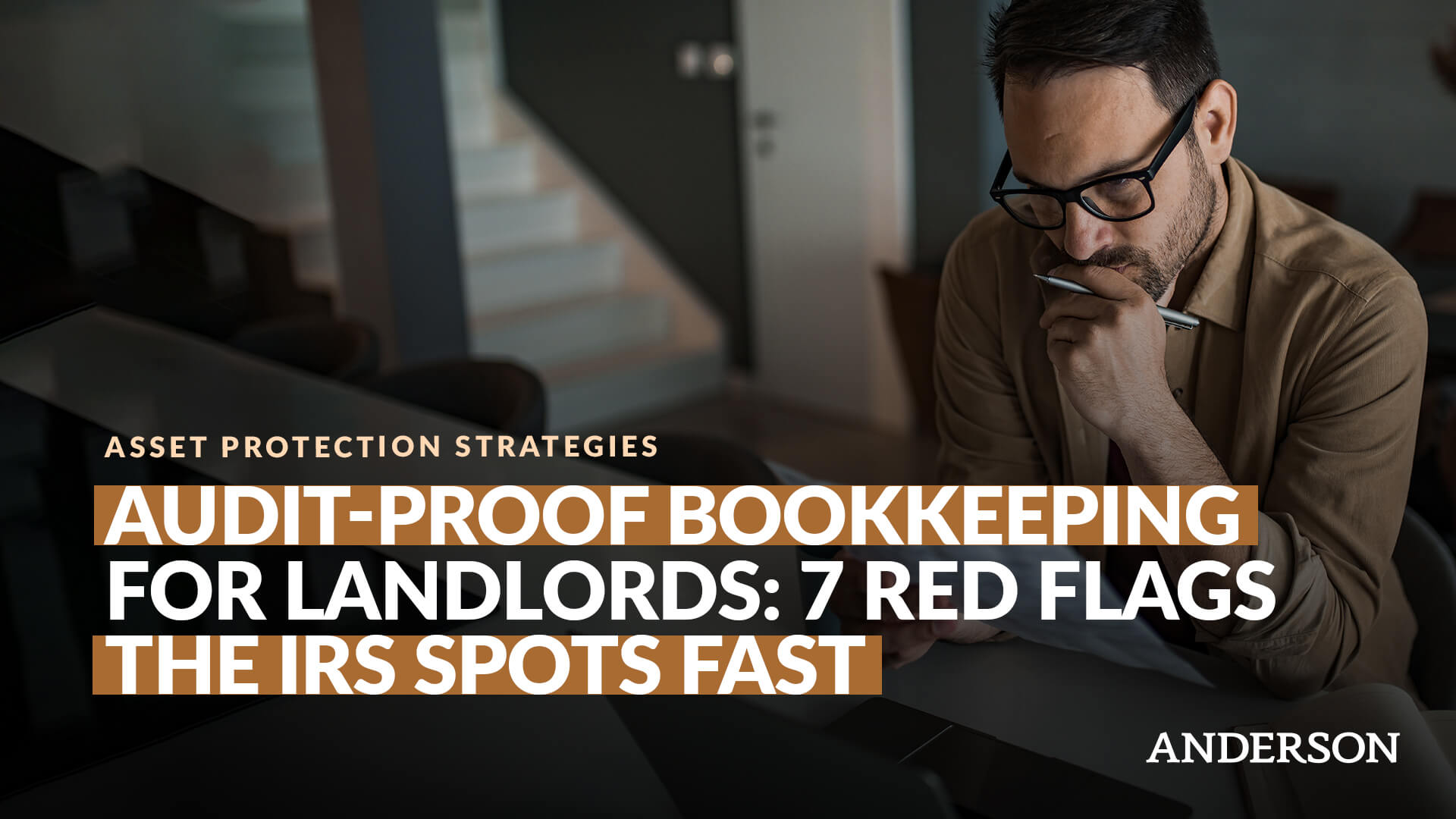
Why Does Bookkeeping Matter So Much for Landlords?
For real estate investors, bookkeeping is more than tracking numbers—it’s about protecting your cash flow, ensuring accurate tax reporting, and maintaining asset protection. Poor bookkeeping creates audit risk and increases your tax liability. It also makes it easier for an attorney to pierce your LLC and go after personal assets.
Audit-proofing your books means your rental income and expenses are accurate, well-documented, and compliant. Clean recordkeeping is one of the most effective tax strategies for landlords seeking to maximize long-term profits.
Here are the seven red flags the IRS spots fast when reviewing landlords’ returns:
- Commingling personal and business funds
- Misclassifying repairs and improvements
- Missing W-9s or 1099s for contractors
- Travel, auto, or meal deductions without logs
- Depreciation errors and incorrect land allocation
- Using passive losses to offset W-2 income without REPS/STR qualification
- Income mismatches and mismanaged security deposits
Each issue can lead to penalties, disallowed deductions, or an audit that drains time and money.
Get ahead now: Download the Free Landlord Audit Binder Checklist to set up your recordkeeping system. It includes templates for tracking income and expenses, storing receipts, recording mileage, and organizing financial reports.
1. What Happens If You Commingle Personal and Business Funds?
Commingling is one of the easiest ways to lose your audit defense. Using your credit card or bank account for both personal and rental transactions blurs financial lines. It also destroys the separation between you and your LLC—jeopardizing your liability protection.
To fix it:
- Open a dedicated checking account and credit card for each property or LLC.
- Record every transaction with its purpose and related property noted.
- Utilize the best accounting software for landlords, such as QuickBooks Online, Stessa, or AppFolio, to automate expense categorization.
- Generate monthly financial reports that clearly outline rental income, maintenance costs, and cash flow.
Maintaining separate accounts ensures every expense on your Form 1040 and Schedule E is defensible during tax season.
2. How Does the IRS Distinguish Repairs from Improvements?
The difference between a repair and an improvement can change your tax outcome. Repairs (like fixing a leak) are deductible immediately. The IRS requires you to capitalize and depreciate improvements—such as replacing a roof—over multiple years.
Misclassifying these costs distorts your reporting income, creates errors on your tax returns, and invites an audit.
To fix it:
- Adopt a written capitalization policy to expense items under $2,500 per invoice.
- Utilize routine maintenance and small taxpayer safe harbors to deduct regular expenses, such as repainting, carpet cleaning, and replacing appliances.
- Keep dated invoices, receipts, and photos documenting what was done and why.
Proper classification protects your tax deductions and strengthens your long-term tax strategy.
Request a free consultation with an Anderson Advisor
At Anderson Business Advisors, we’ve helped thousands of real estate investors avoid costly mistakes and navigate the complexities of asset protection, estate planning, and tax planning. In a free 45-minute consultation, our experts will provide personalized guidance to help you protect your assets, minimize risks, and maximize your financial benefits. ($750 Value)
3. Do You Need W-9s and 1099s for Every Contractor?
Yes—and missing them is a clear audit signal. When you pay a contractor more than $600 in a year, you must issue a 1099-NEC unless the contractor is incorporated. Missing 1099s indicate inconsistent income reporting and will trigger IRS scrutiny.
To fix it:
- Collect a W-9 form before any contractor begins work.
- Track all payments through your bookkeeping software.
- Send 1099-NEC forms by January 31 and reconcile them against your expense reports.
- Keep a folder labeled “Contractor Compliance” with digital copies of all W-9s and 1099s.
By maintaining these records, you accurately document your rental expenses, ensure your taxes are filed correctly, and avoid unnecessary penalties.
4. Why Do Travel, Auto, and Meal Deductions Get Disallowed?
Landlords lose travel and meal deductions when they don’t maintain accurate logs. The IRS requires contemporaneous documentation—records made at the time the expense occurs.
To fix it:
- Use a mileage-tracking app such as MileIQ or Everlance.
- Record who, what, and why for every business meeting, property visit, or inspection.
- Write the purpose and attendees on each receipt before saving it.
- Store digital copies in your real estate bookkeeping system.
Example: “Lunch with broker to discuss 2025 lease renewals for Maple Ave rentals.”
Accurate logs prove your business purpose and protect you at tax time, especially when you claim home office or property management deductions.
5. What Are the Most Common Depreciation Mistakes?
Depreciation gives real estate investors one of their strongest tax-saving advantages, but it’s also one of the easiest areas to miscalculate. Many landlords depreciate the entire property over 27.5 years, rather than separating the land value from shorter-lived assets.
To fix it:
- Conduct a cost segregation study to identify 5-, 7-, 15-, and 27.5-year assets.
- Properly allocate land vs. structure—land is not depreciable.
- Keep closing statements, appraisals, and tax cards for support.
- Work with a CPA who understands real estate investments, bonus depreciation, and property allocation rules.
Correct depreciation improves your cash flow, increases your tax deductions, and reduces your tax liability.
6. Can You Use Passive Losses to Offset W-2 Income?
Only under specific conditions. Many property managers incorrectly apply passive losses from rentals to offset their W-2 income. Without a Real Estate Professional (REPS) or Short-Term Rental (STR) qualification, the IRS will disallow it.
To fix it:
- Track at least 750 hours per year in real estate activities, and ensure that’s more than half of your working time.
- STR owners must average seven days or less per stay and materially participate (100+ hours).
- File an aggregation election (Form 8582) to treat all properties as one activity.
- Maintain a daily time log that includes specific actions, such as tenant screening, property maintenance, and marketing.
Consistent records prove your material participation, strengthen your tax strategy, and help you legally use rental losses to offset income.
7. Why Do Income Mismatches and Security Deposits Trigger Audits?
The IRS compares your rental income, 1099 forms, and bank deposits. If the totals don’t align, you appear to be underreporting income. Mixing security deposits into your rental income account creates similar confusion.
To fix it:
- Reconcile monthly: lease ledger → deposits → 1099s → bank statements.
- Create a separate bank account for security deposits and record them as liabilities.
- Label all Cash App, Venmo, or Zelle transfers clearly as rent, refund, or deposit.
- Use your bookkeeping software to categorize income and expenses automatically.
When the IRS sees clean, reconciling books, it confirms that you’re reporting income accurately and filing taxes with integrity.
How Can You Audit-Proof Your Bookkeeping Right Now?
Audit-proofing your books protects more than your tax return—it protects your business. It helps you file accurate taxes that reflect your rental income and expenses while maximizing your legal tax savings.
Here’s what every landlord should do:
- Automate bookkeeping. Use the best accounting software for landlords to simplify tracking income and expenses.
- Reconcile monthly. Match deposits and payments to your ledgers.
- Document deductions. Save every receipt related to repairs, travel, and maintenance costs.
- Generate reports. Review your financial reports quarterly to understand cash flow trends and identify any missed deductions.
- Plan proactively. Work with professionals who specialize in full-service bookkeeping and tax strategy for landlords.
At Anderson Advisors, we help landlords and real estate investors implement audit-ready bookkeeping systems, maximize tax deductions, and safeguard assets for the long term. Whether you own one rental or a growing portfolio, we’ll help you structure your finances for maximum tax efficiency and minimal stress at tax time.
Schedule a Free Strategy Session. Our full-service bookkeeping team will review your structure, evaluate your real estate bookkeeping system, and identify opportunities for greater tax savings and stronger protection. Then, organize your records with the Free Landlord Audit Binder Checklist—your complete roadmap to clean books, lower risk, and confident compliance.















